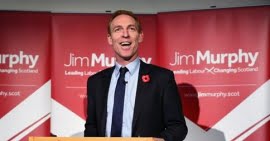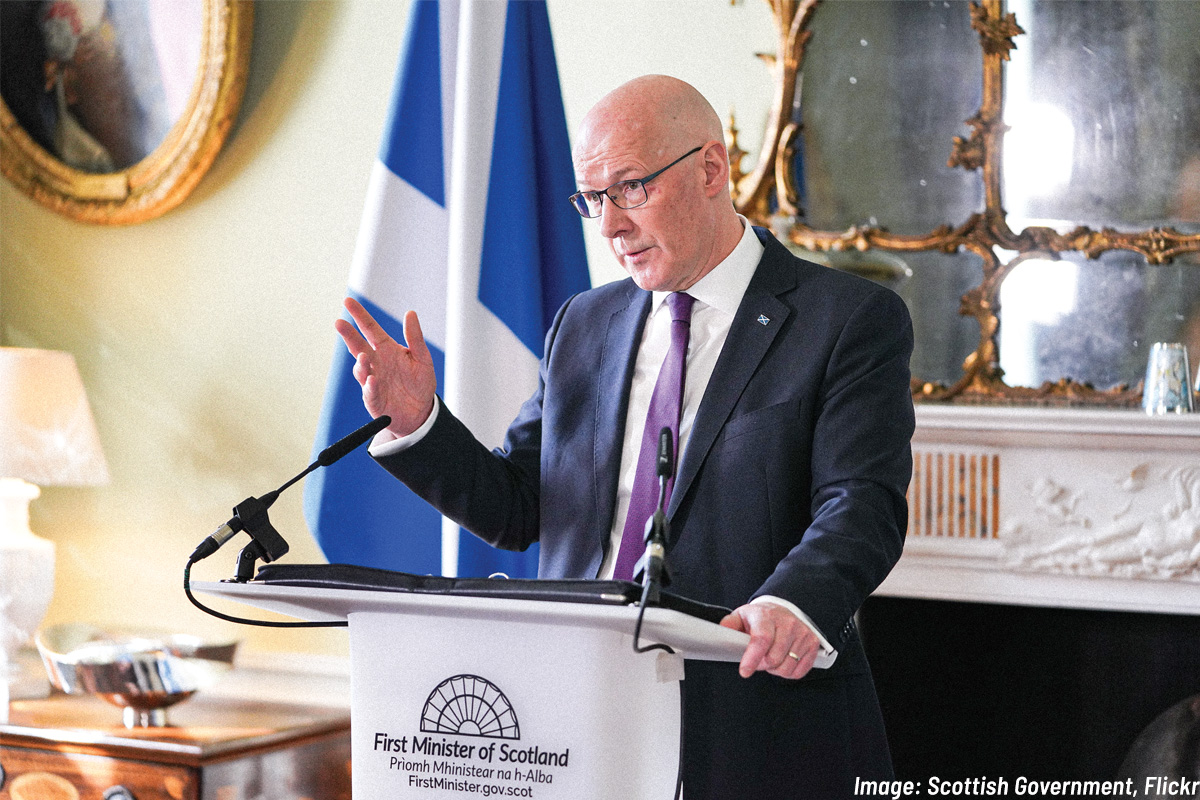The Blairite Jim Murphy has been elected as the new leader of Scottish Labour. This new leadership begins in far from happy times for the Labour Party, with Labour predicted to be heavily beaten by the SNP in Scotland at the next General Election. It is set to be a turbulent political period ahead in Scotland and the rest of Britain.
The Blairite Jim Murphy has been elected as the new leader of Scottish Labour, accompanied by another right-winger, Kezia Dugdale, as deputy leader. Neil Findlay and Katy Clark offered strong competition, and a relatively good result in comparison to left challenges over the past few years. However, Murphy still won the poll by a large majority, by 56% to Findlay’s 35%.
This new leadership begins in far from happy times for the Labour Party. The party has been out of power at Holyrood since 2007, when the SNP formed their first minority government. In 2011 the SNP further built on this success, winning a complete majority – previously thought almost impossible under proportional representation.
Labour’s decline
The nationalists’ rise has also been a story of Labour’s decline. Labour has been widely discredited in Scotland, peddling policies such as “carry a knife, go to jail”, the centrepiece of their 2011 manifesto. Their leadership’s total distance from the plight of the working class in this period of austerity was encapsulated by the former leader, Johann Lamont, who stated that what Scotland really suffered from was a “something for nothing” culture. This was only heightened by promises from Ed Miliband of continued austerity under a Labour government at Westminster. Ed Balls went as far as to say that Labour cuts would result in “bleeding stumps”, with public services being hacked to the bone.
Amidst this seemingly never-ending rightwards drift of the Labour Party, the SNP’s emphasis on Obama-esque “change” – with social-democratic measures such as free higher education and prescriptions – has gained increasing popularity. The referendum acted as a turning point which brought these differences onto a qualitatively higher level.
The SNP-led YES campaign promised change and a fairer Scotland, in opposition to the food banks of austerity Britain. Meanwhile, Labour jumped into bed with the Tories and Lib Dems in the unholy “Better Together” alliance, offering nothing more than pro-establishment scare mongering. As a consequence, the YES campaign gained 45% of the vote, a massive increase on its previous support.
A qualitative change in consciousness
The referendum marked a major shift in Scottish politics. 97% registered to vote and there was an 85% turnout, the highest turnout at any vote in Britain since the extension of universal suffrage. Huge numbers of young and working class people came into politics for the first time, with many invigorated by the promises of change offered by the YES campaign. Nearly 40% of Labour voters voted YES, and areas that saw a majority YES vote – such as Glasgow, West Dunbartonshire and North Lanarkshire – are working class, traditional Labour strongholds.
Since the referendum, the momentum behind YES has been reflected in the huge numbers joining the pro-YES parties. The SNP has grown to nearly 100,000 members – and this in a country of 5 million people! They are now the third-largest party in Britain. The Greens have trebled their membership; the Scottish Socialist Party have gained thousands of new members; and the Radical Independence Conference was attended by over 3,000 people at the end of November – an attendance that could have been even higher, had tickets for this not sold out in September.
The latest YouGov Scottish poll (13th December), meanwhile, predicts the SNP will win 47% of the Scottish vote at the 2015 general election, in comparison to 27% for Labour, suggesting the Labour Party will be reduced to 4-5 seats from their previous 40. The results of the poll also show a majority are now in favour of independence. Whilst there may be a small drift back toward Labour at the General Election, the party still finds itself in a dire situation.
Rightward shift for Labour
The leadership election was viewed by some as an opportunity for Labour to revitalise itself in Scotland. The election of Murphy has dashed such hopes. With his right-wing credentials, any attempt to reverse Labour’s fortunes will run into the sand. His Blairite credentials have meant he has never defied the Labour whip. As leader of the National Union of Students, Murphy supported the introduction of tuition fees. He was also a major advocate of the Iraq war and Blairite privatisation. Without a doubt he is a prime example of the unashamedly careerist and pro-capitalist nature of the New Labour project. Murphy’s election confirms that Labour will remain rooted to right-wing policies. He has talked about putting Scotland first, but this is mere demagogy, a cover for his bankrupt policies.
The majority of those who have turned towards the SNP are not doing so from an overtly “Braveheart” nationalism, but out of hatred for the Tories and the need to fight austerity. Many have criticised the nationalists, stating that their social democratic image is false. This is doubtlessly true. As a pro-capitalist party, the SNP leadership vacillates between appealing to voters and appealing to big business.
In the referendum this was shown in their anti-austerity image being accompanied by promises of a business-friendly environment and a cut in corporation tax. Such pro-business policies can only be paid at the expense of working people.
Since the referendum, the SNP have said that they would not support the Tories at Westminster, and at the same time have presided over the continued privatisation of the rail network. The emphasis on Scottish nationalism that supposedly cuts across all class barriers is completely hollow. To think that unemployed youth in Parkhead have the same class interests as a privately educated banker in Park Circus shows the utter emptiness of such an idea.
The crisis of reformism
Many on the Labour left looked to the campaign of Neil Findlay and Katy Clark for Labour leadership as an opportunity to pull the party to the left. In the end, Findlay won just 35% of the overall vote, 33% of the members’ vote and 52% of the affiliates’ (mostly trade unions) vote. Clark won 37% of the overall vote, 34% of the members’ vote and 64% of the affiliates’ vote. The party machine backed Murphy and this is reflected both in his winning 60% of the membership vote and 67% of the parliamentary vote. This shows how dominant the right is in the Scottish Labour Party and how weak is the left. This is a reflection of the degeneration over the last 30 years.
On the basis of big historical events, and a big shift in the class struggle, this could change. But for the present, the election of Murphy will only serve to compound Labour’s problems.
All across the world we can see the demise of the social democracy as it has aligned itself with capitalism. This is not the post-war period where reforms were possible. We are living through a period of capitalist crisis. The ruling class is demanding that the working class should pay for the crisis through austerity. The crisis of capitalism is so profound that it has no reforms to give.
The Labour Party leaders have capitulated to capitalism and are prepared to carry out the dirty work of big business. All they can offer is more of the same. This happened in Greece and Spain – the PASOK and PSOE (their respective “socialist” parties) – introduced huge austerity measures.
Consequently their support collapsed: PASOK is on around 5% in the polls, while the PSOE has fallen to 25%. Similarly in France, Hollande of the Socialist Party is now one of the least popular presidents ever after (following a stiff word from the French ruling class and Angela Merkel) failing to deliver on his manifesto. Meanwhile parties to the left – Syriza and PODEMOS – have arisen and are now leading the polls in Greece and Spain respectively.
Warning: crisis ahead
Many on the left in Scotland are looking to these left parties as the model to follow. They show that new parties can emerge from the mass movements of this convulsive period.
However, there is a warning. Even these left parties have no clear ideas. They reject austerity, but seek to reform the capitalist system. They have therefore made compromises already. Alexis Tsipras, the leader of Syriza, has gone from stating that his party would repudiate the Greek debt, to the ‘more moderate’ demand of asking if only half of it could be written off.
Such a “solution” will not solve the problems of the Greek workers. European capitalists look to claw back every single penny and will continue to demand deep austerity to pay for it. Unless you break with capitalism, put forward a socialist programme and look to the working class to change society, you are doomed to play by its rules.
There is a real appetite for change in Scotland, and this is accompanied by a rejection of capitalist austerity. Tens of thousands of young people and workers have been brought into politics for the first time and many are expressing radical ideas within various pro-independence organisations.
Neither patching up capitalism nor nationalism can offer the change desired by many. Instead we must offer the ideas of Marxism and revolutionary socialism, the only way we can really change society!






